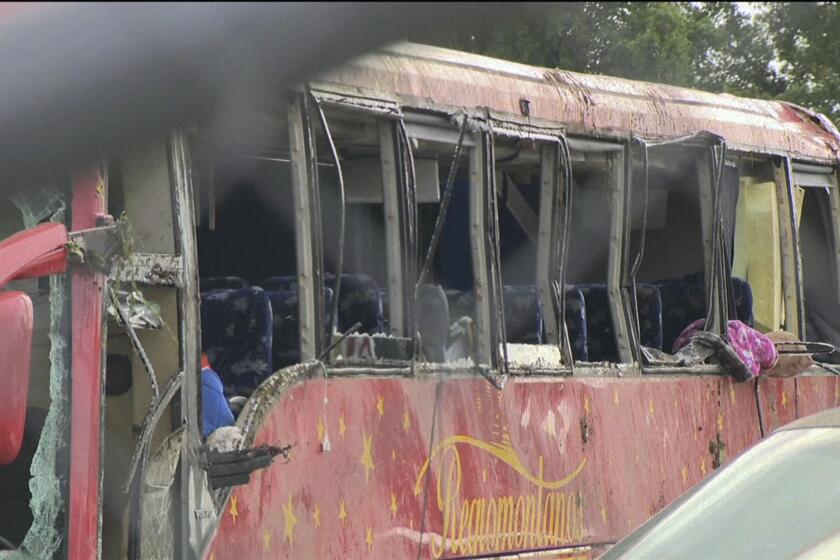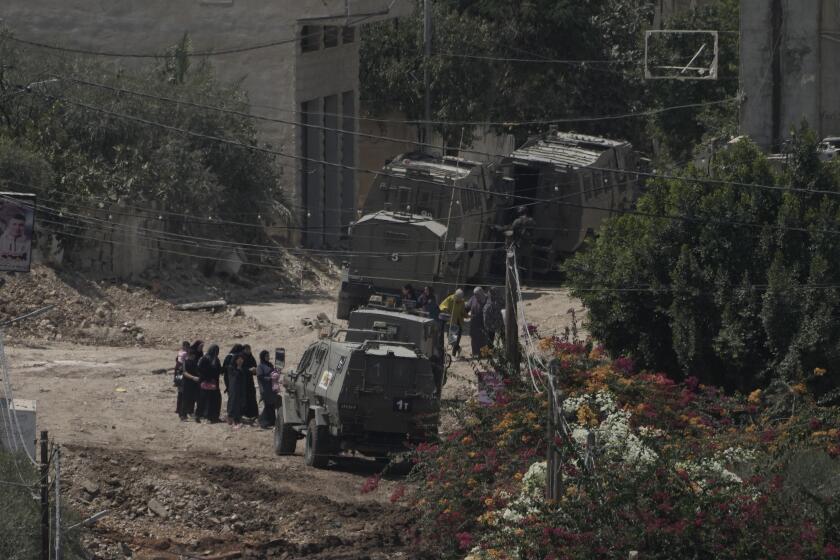Tribe Offers Up Its Land to Store Nuclear Waste
They’re only a few dozen adults, these Goshute Indians who call this lonesome range land home, but they’ve whipped Utah into a fit with their get-rich plan to store the nation’s nuclear waste.
The tribe, with 70 mostly poor adults, hopes to make tens of millions of dollars by storing 40,000 tons of highly radioactive waste from eight utility companies. The waste would be kept on their reservation here, 50 miles southwest of Salt Lake City, until a permanent depository is built, most likely at Yucca Mountain in Nevada.
The Indians’ deal with the utilities needs only the blessing of the Nuclear Regulatory Commission, which infuriates Utah’s leaders. They complain that the whole state would be imperiled for the financial benefit of a tiny tribe over which they have no regulatory control.
The tribe argues that its reservation, where 25 members live, is better suited for storing nuclear waste than for farming. It was once described by Mark Twain as a rocky and repulsive wasteland.
“We were given the land to use--and this is how we want to use it,” said Tribal Chairman Leon Bear, 46, a onetime security guard.
The state has filed multiple lawsuits, contesting the NRC’s right to license a private storage facility and the utilities’ creation of a private company that shields them from liability should something go wrong. It has seized control of the two-lane Skull Valley Road leading to the reservation and banned the transportation of radioactive waste on it. And it’s supporting federal legislation that would prevent the utilities from constructing a 30-mile-long rail line to convey the waste to the reservation.
“I have one focus these days--to stop the storage facility from being licensed,” said Gov. Mike Leavitt. “We don’t produce nuclear waste, and we refuse to store it for those who do.”
The utilities have filed their own lawsuits to defend the plan.
The dispute--a recurrent one in the West where Indian lands are plentiful--derives from the special status Indian tribes were granted by treaties they signed in the 19th century. Theoretically, they were regarded as sovereign nations, the equal of the United States, with absolute control over their land. That independence has been eroded over time and they are ultimately subordinate to the federal government, but they have maintained independence from most state and local government regulation.
Local officials and environmental activists are incredulous over how a project of this magnitude could face so little scrutiny, especially given the level of debate over the proposal to permanently bury 77,000 tons of nuclear waste at Nevada’s Yucca Mountain.
“Yucca took 20 years of study, a Department of Energy and presidential recommendation, a governor’s veto and action by Congress,” said Jason Groenewold, spokesman for Heal Utah, a coalition of environmental organizations. “Here, we have a few nuclear utility companies getting together with a few members of a Native American tribe, essentially determining our nation’s nuclear waste policy.
“Certainly, Congress never intended this.”
In fact, it was the federal government that gave the tribe the money-making idea.
Congress had ordered the Department of Energy to take nuclear waste off utilities’ hands but, in the late 1980s, it was hard pressed to find a state to take it. Energy officials instead invited the nation’s tribal leaders to open up their reservations for temporary storage.
The department scuttled the idea, but the financially strapped Goshutes pursued it on their own. The tribe needed the money to provide health care, housing and other social programs--as well as income--for its members. Bear won’t disclose how much money the tribe would make, but Sammy Blackbear, a tribal member who opposes the project, said it would generate $48 million over 40 years for the Goshutes.
Eight utilities, including Southern California Edison, formed a company called Private Fuel Storage and, in 1997, signed a contract with the tribe to send spent fuel rods here for as long as 40 years. If there is no permanent disposition by then, the utilities are expected to take back the material.
After five years of study, the NRC staff has concluded that the project meets federal regulations and does not pose an environmental risk, said NRC project manager Mark Delligatti. The Atomic Safety and Licensing Board is hearing objections and is expected to offer its recommendations to the NRC later this year. The NRC’s five commissioners may make the final decision by year’s end.
If the NRC approves the utility-financed $3.1-billion project, the storage facility could open by early 2005. The utilities would then begin delivering 40,000 casks, each containing 10 tons of uranium fuel rods surrounded by 170 tons of concrete and steel. They would stand on a reinforced concrete parking lot--like 19-foot-high nuclear silos--spread across 100 acres of what is now dry brush and grass.
The eight utilities generate 20% of the nation’s nuclear power, mostly in the South, the northern Plains and the Northeast.
“Some of the utilities are running out of on-site storage space, waiting for Yucca Mountain to be ready,” said Private Fuel Storage spokeswoman Sue Martin. “We’re trying to avoid having to shut down a reactor for lack of storage for spent fuel.”
The reservation is in Tooele County, whose commissioners agreed to the project. In exchange for providing law enforcement and hazardous material cleanup support to the utilities, the county could receive as much as $400 million over 40 years. The project, Bear says, is in keeping with the development of the region, which over the decades has become home to other hazardous ventures.
Near the 18,000-acre reservation, the Army tests how to battle anthrax and other chemical, nerve and biological agents at the Dugway Proving Ground. At another site about 20 miles away, the Army is incinerating nearly half of the nation’s stockpile of chemical weapons. Thirty miles in a different direction, a private company has been burying low-level nuclear waste with the state’s approval for years. The region’s mining companies, alongside the Great Salt Lake, are among the nation’s biggest industrial polluters. And to the west is one of the Air Force’s largest bombing and cruise missile ranges.
Two years ago, Congress passed legislation effectively banning construction of rail lines to the reservation unless the Defense Department concludes that it would not affect its training mission. Military officials object to the nuclear waste facility because it would force F-16s to detour around Skull Valley en route to bombing ranges.
In a further effort to ban the rail line, the House of Representatives on May 14 attached an amendment to the military appropriations bill that declares the land as a wilderness study area. If the amendment is approved by a House-Senate conference committee, access to the site would be all but blocked.
The state continues to bombard the NRC with objections, citing concern that a military jet or errant cruise missile may crash on the site. State officials argue that the integrity of the site is compromised by seismic activity in the mountain ranges that frame the valley.
They also question whether the tribe still wants the deal.
Some of the Goshutes claim they recalled Bear as chairman for his refusal to share contract details with them and have sued the Bureau of Indian Affairs for signing off on the project.
“We’re here to protect the land, not destroy it,” said dissident tribal member Blackbear, who claims that a majority of the tribe now opposes the project.
Bear maintains that his recall was not valid. The BIA refuses to intervene and still recognizes Bear as tribal leader. The utilities contend that the contract remains enforceable.
The controversy has overshadowed any attention that Nevada had hoped to generate in Utah in its fight to kill the Yucca Mountain project, 90 miles from Las Vegas.
Because about 90% of the waste destined for Yucca Mountain is expected to travel through Utah, Nevada launched an ad campaign on Salt Lake TV stations earlier this month. It raised the possibility of nuclear fuel being spilled in Utah due to accident or terrorism and asked viewers to call Utah’s senators to voice their objection.
Local polls indicate half of Utahans support storing nuclear waste in Nevada--even if it means traveling through Utah--but four out of five oppose temporary waste storage on the Goshute reservation.
“I’m against it going out on the reservation,” said Eric Thomas, who runs an excavation company in suburban Roy. “I think Yucca Mountain should be opened, and that the utilities should just move the waste once--to Nevada.”
But the utilities say they can’t wait that long. And Bear said Utah officials are applying double standards against the tribe.
“Utah says it doesn’t want nuclear waste in its backyard,” he said. “But look around. We’re already surrounded by toxic waste--and none of it is [financially] benefiting the tribe. Now it’s our turn to benefit.”
More to Read
Sign up for Essential California
The most important California stories and recommendations in your inbox every morning.
You may occasionally receive promotional content from the Los Angeles Times.






